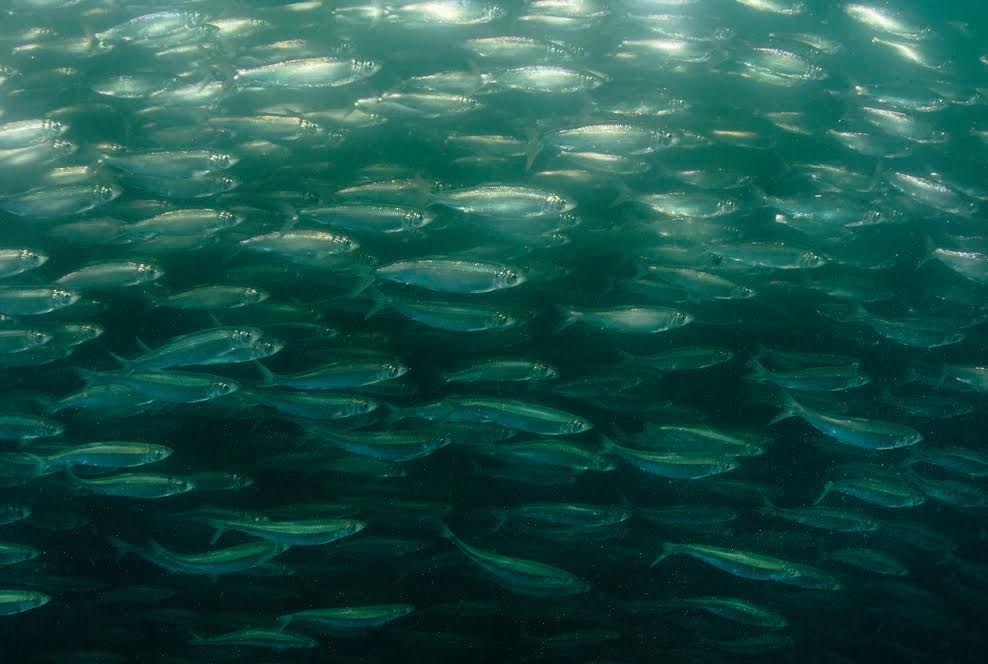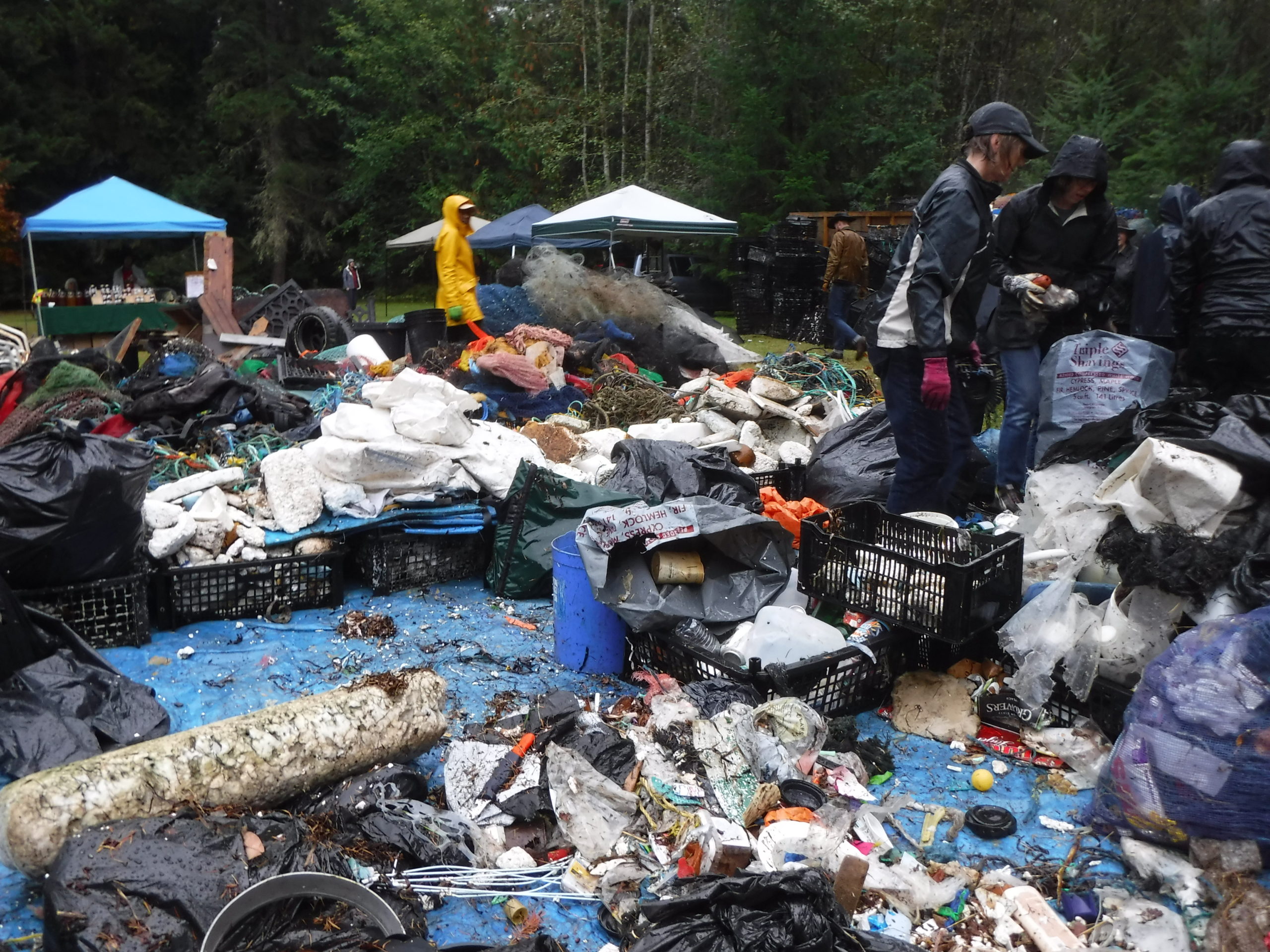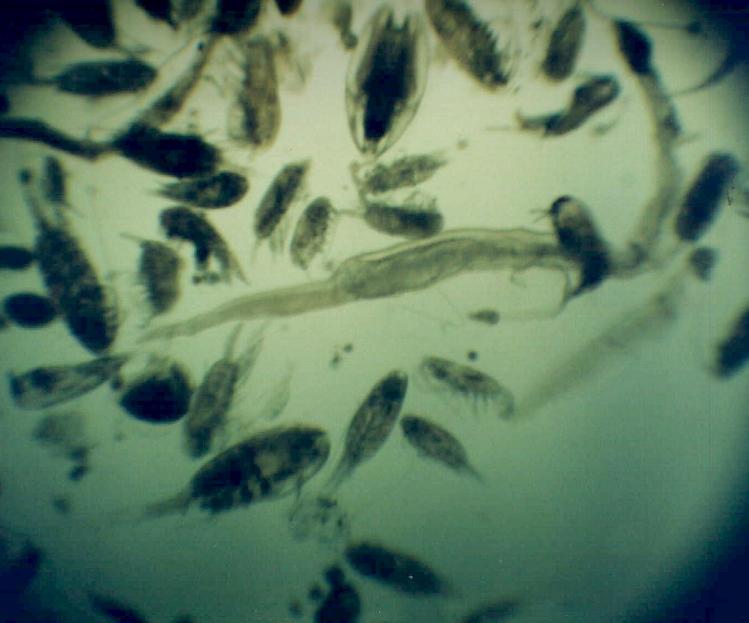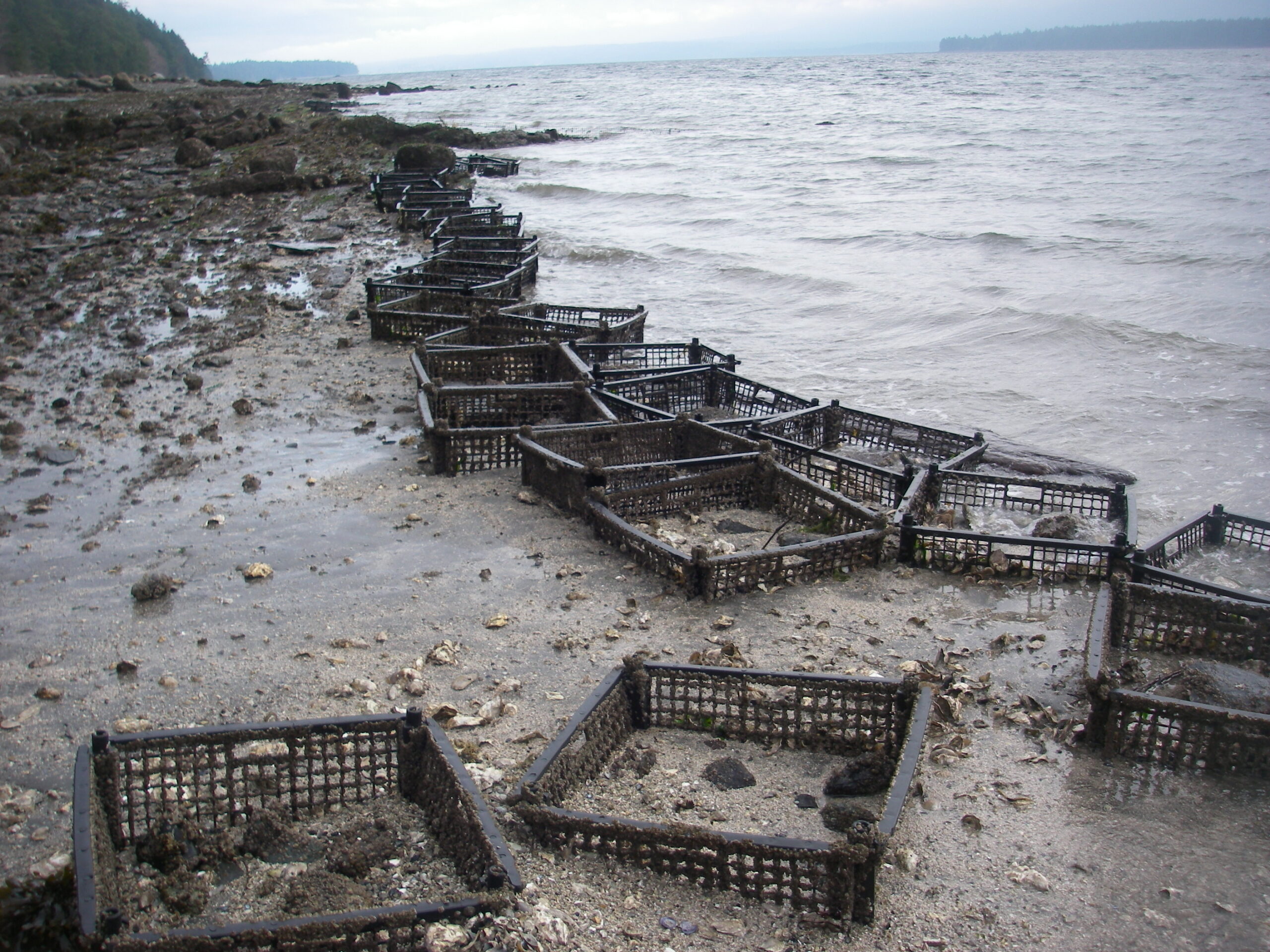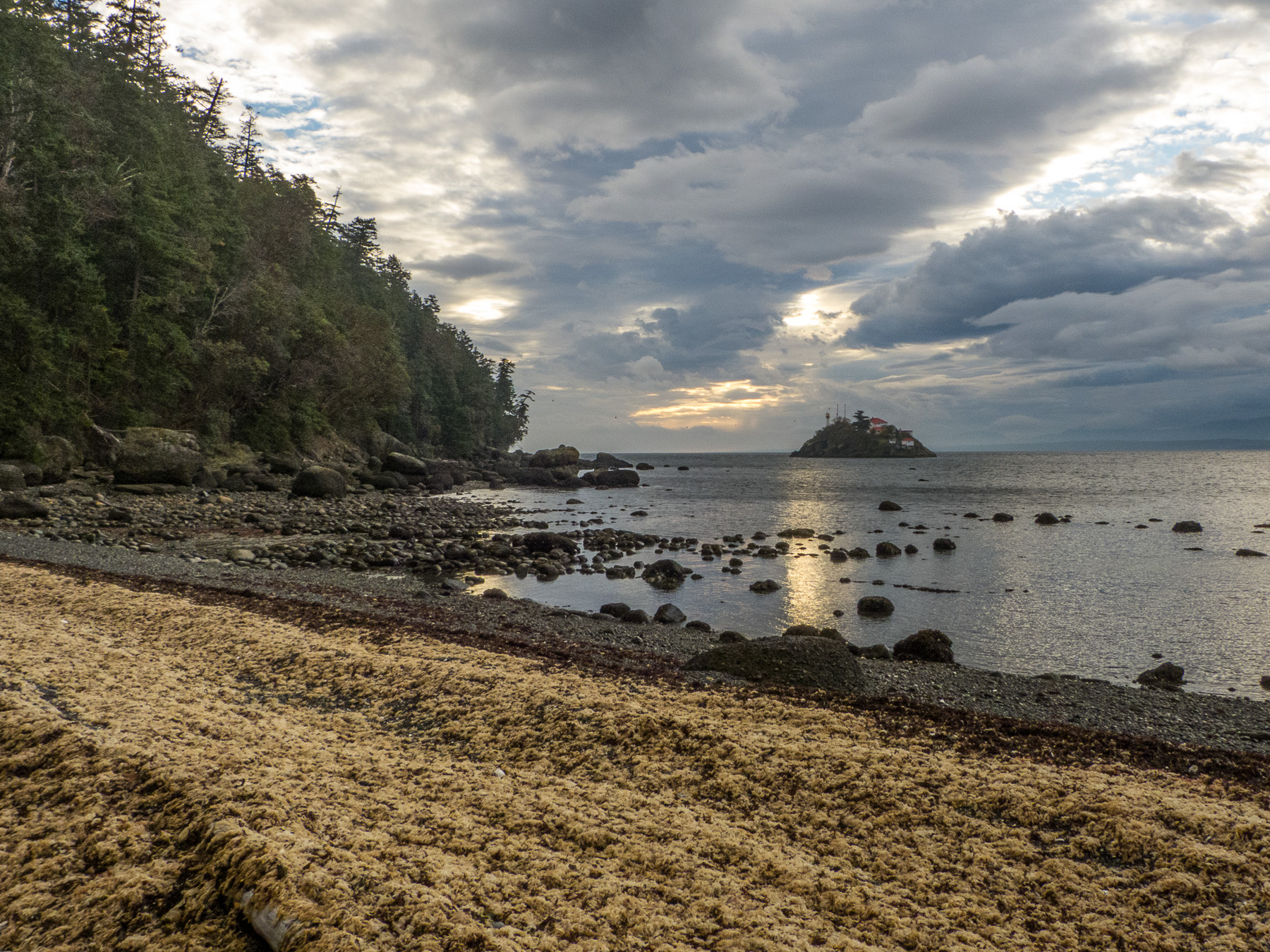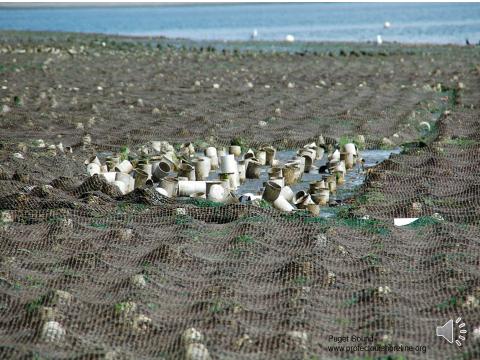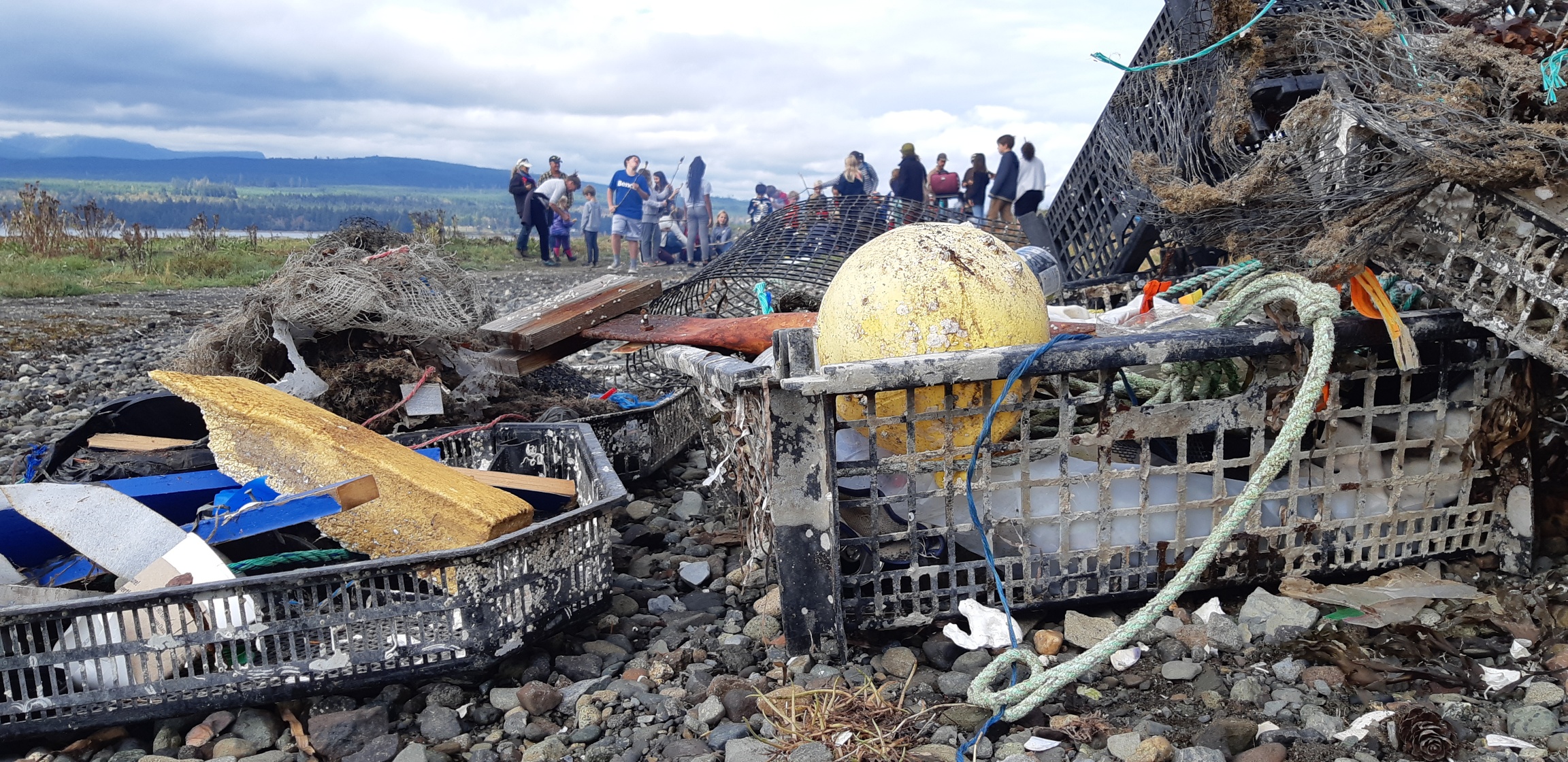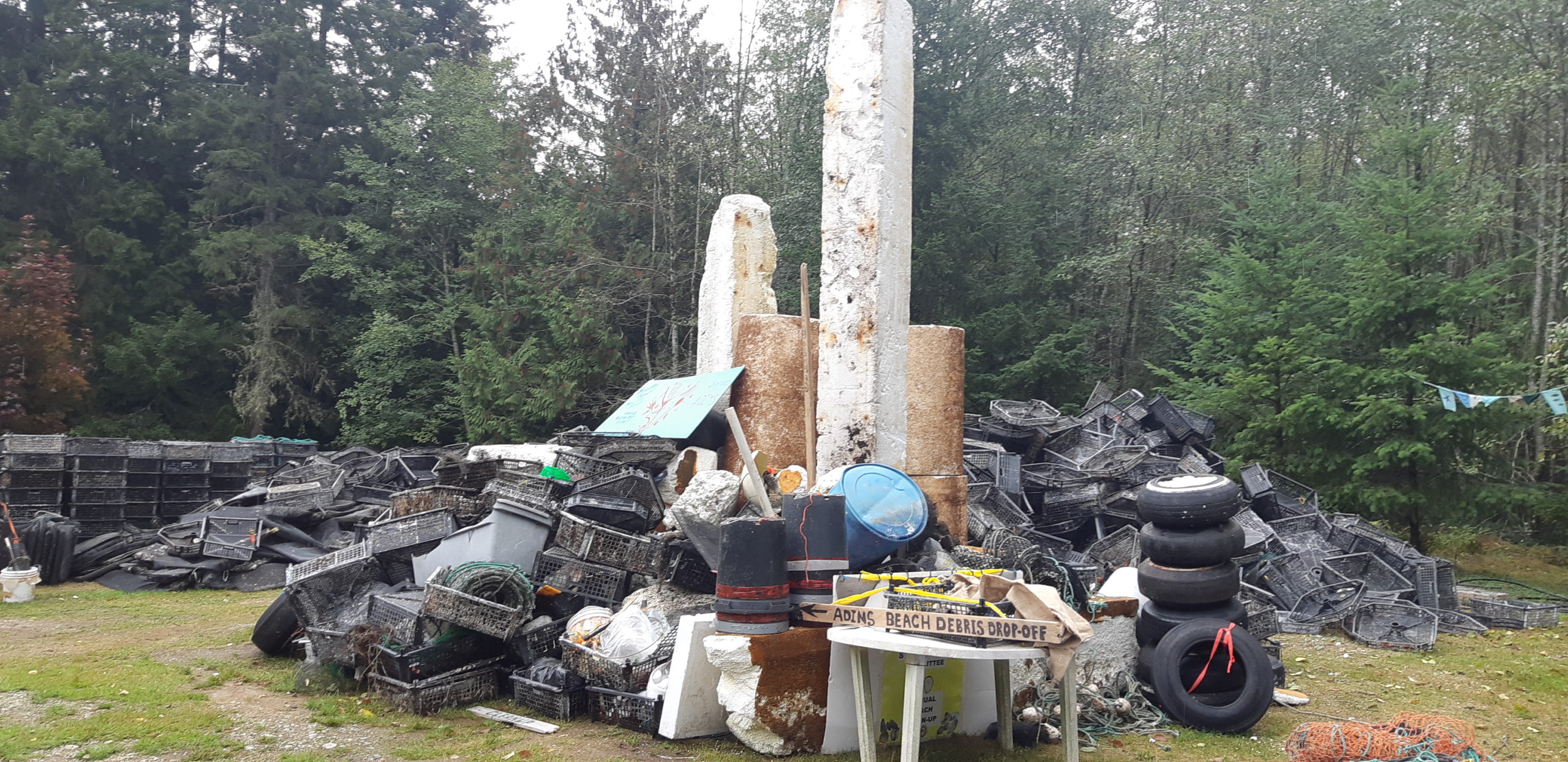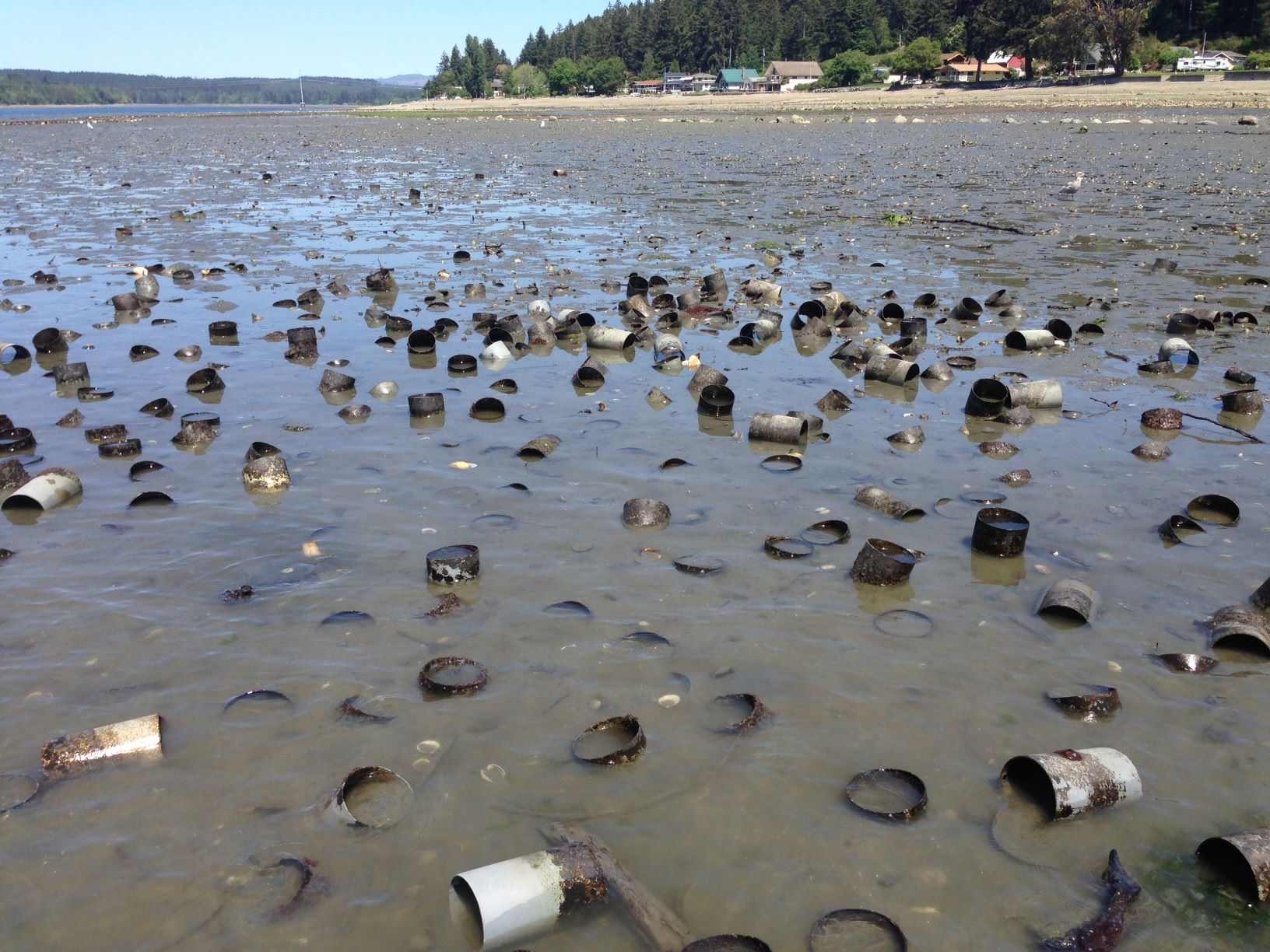Herring spawn 2019: a time of anticipation, a time of mourning
by Barbara Mills
The local Pacific herring spawn is an amazing, almost spiritual event. It is one of the great migrations left on earth and reminds us of the amazing cycle of nature at its best. Millions of herring arrive, accompanied by the array of creatures of air and sea that they serve to nourish. They spawn and this navy sea turns aqua; a veritable feat of nature. Sea birds come by the thousands to fatten up on their way north to breed. Scores of eagles carry herring back to their perches in the trees. Hundreds of seals and sea lions feast, bark, raft and roar with flippers in the air. Whales arrive to take advantage of the veritable feast.
When I first came to live on Denman seven years ago, I was blown away by this amazing event. It seemed like half the island was on the beach celebrating the annual return and its affirmation of the wealth of the sea and life around us. Islanders photographed the eagles, played, picnicked, and even sampled the roe that clung to the sea weed. This year, as an armada-like gathering of herring trawlers and gillnetters covered the entire width of the horizon, the mood was profoundly different. There was an undeniable sense of mourning and helplessness.
Many of us had signed the petition demanding that the Federal government ban the herring kill fishery, knowing that it is no longer profitable, and that 90% of the fish caught go to feed the fish farms. With Pacific salmon, orcas, sea lions and sea birds declining at an alarming rate, we know that this keystone species must be left in the ocean to feed the food web. We know that if herring are left in the sea, they can spawn as many as 7 times, continuing to help sealife survive and perhaps recover. We know that killing these essential sources of nourishment makes no ecological sense.
So this sad year, instead of a celebration, being on the beach became an act of bearing painful witness to one more way that humankind is mindlessly destroying the wealth of this amazing planet. If you weren’t on the beach, the video below says it all!! Thanks to Sussan Thomson for documenting this event.
https://vimeo.com/324898151
This video clip glimpses the gill net fishery and herring spawn in Lambert Channel, in front of our place, Denman Island on March 15, 2019 [2:23]
Why we clean up the beaches
Sussan Thompson explores an island's commitment to protecting and restoring its ocean environment. Her video examines the philosophies and principles behind the sheer hard work of the annual beach cleanup, which pulls 6 tons of mostly plastic waste and debris off Denman Island's shores. Yes, every year. (4:09)
Zooplankton and Microplastics: a research project begins
Research Scientists meet with ADIMS and KFN Guardian Watchmen on Denman Island
by Barbara Mills
Governments change, and government bureaucracies often evolve too slowly to address even the most urgent needs of a community and the environmental ecosystems that sustain them. Often community-powered, locally informed initiatives have to be the first step to jump start meaningful action. This is what is happening in Baynes Sound and Lambert Channel, one of the most important ecosystems on the coast of BC.
Last Saturday members of the K’omoks First Nation (KFN) Guardian Watchmen and the Association for Denman Island Marine Stewards (ADIMS) co-hosted UBC scientists Brian Hunt, Juan Jose Alava, and Natalie Mahara, who will research the impact of marine microplastic contamination on the health of zooplankton, and subsequently on the early growth stages of herring larvae in Baynes Sound.
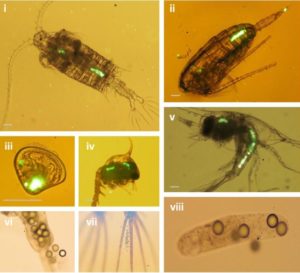
Saturday’s initial visit was a field test for six further samplings planned for March and April, approximately one every week after the herring spawn, until most of the young herring leave Baynes Sound. Later samplings, to be taken in August in the Strait of Georgia by other researchers, will augment our research, and may show ingestion of microplastics in juvenile herring.
This zooplankton research is one of three locally generated initiatives that involve cooperative planning and funding between First Nations, local environmental organizations, local governments, as well as environmental organizations that work at the national level.
The second is the Pollution Tracker project, which has taken samples from the north end of Baynes Sound this February, and will report back to us on the presence of heavy metals, microplastics and several persistent organic pollutants, like PCBs and DDT.
The third initiative began with the Baynes Sound and Lambert Channel Ecosystem Forum in May of 2018, when we met with over 40 other stakeholders to share knowledge and identify collaborative actions to support the health of this ecosystem. Two further roundtables are planned for March and October this year.
We are hoping that these initiatives will encourage governmental bodies to more urgently address the complex needs of this vital region.
Parliament passes Gord John's Bill M151 on plastic pollution
Congratulations to our MP Gord Johns
and his team of Ocean Defenders
With all the full and busy times of the December holiday season, we neglected to officially mark and celebrate one of the most important initiatives of 2018. Our MP Gord Johns’ Parliamentary Motion M151 was passed unanimously in Parliament on December 22, 2018 by a vote of 288 to 0. This achievement is unprecedented for a first term opposition MP. Gord is a true protector of our country’s oceans and environment.
https://youtu.be/fOh1aCRxbIU
M151: A National Strategy to Combat Plastic Pollution
The motion to the House of Commons aims to:
- Create a permanent, dedicated, and annual funding for community led clean-up projects
- Reduce and regulate consumer and industrial use of ‘single-use’ plastics
- Create a plan to clean-up derelict fishing gear
- Promote education and outreach campaigns on the root causes and negative environmental effects of plastic pollution
- Extend producer responsibility
- Address the root problem and redesign the plastic economy
Mr. Johns began to work with local environmental champions on the challenge of marine debris and ocean plastics right from the start of his term in office. This goal intensified in 2018 when he began working with 40 different allies, including U. of Victoria Environmental Law, the Vancouver Aquarium, Ocean Legacy, ADIMS and a wide range of environmental advocates in his riding. After he initially presented his motion in parliament, on November 2, 2018, he had to “fend off” daily visits from lobbyists from the plastics and packaging industry. He stood firm, and Paliament approved his motion.
Text of Motion M151
—That, in the opinion of the House, the government should work with the provinces, municipalities, and indigenous communities to develop a national strategy to combat plastic pollution in and around aquatic environments, which would include the following measures:
(a) regulations aimed at reducing
(i) plastic debris discharge from stormwater outfalls,
(ii) industrial use of micro-plastics including, but not limited to, microbeads, nurdles, fibrous microplastics and fragments,
(iii) consumer and industrial use of single use plastics, including, but not limited to, plastic bags, bottles, straws, tableware, polystyrene (foam), cigarette filters, and beverage containers; and
(b) permanent, dedicated, and annual funding for the
(i) cleanup of derelict fishing gear,
(ii) community-led projects to clean up plastics and debris on shores, banks, beaches and other aquatic peripheries,
(iii) education and outreach campaigns on the root causes and negative environmental effects of plastic pollution in and around all bodies of water.
Please Don't Wreck the Wrack
Please don't wreck the wrack
by Edina Johnston
Seaweeds are crucial for a healthy environment and even when washed up on the shore, the “wrack” provides an important ecological link between the land and sea. Wrack provides food and shelter for a variety of beach inhabitants and even protects forage fish eggs from the heat of summer or cold of winter.
Recently, biologists found that about 40% of the invertebrate species living on beaches depend on wrack. These little creatures provide food for a variety of animals and birds. Wrack is also a source of plankton, which feeds all the lower beach suspension feeders, enhancing the biodiversity and abundance of life along the coastline.
Wrack decomposes over time, releasing essential nutrients into the beach and acting as rich fertilizer for surrounding ecosystems. One study found that land plants near wrack grow 70% faster than plants without wrack nearby. These plants help stop erosion of the shore during the winter storms or at extreme high tides. Another study found that decomposing wrack also provides nutrients for surfgrass and other plants that grow just offshore in the shallows which are crucial to smaller fish species.
When you remove the seaweed to use in your garden, you hurt the whole food web, from microscopic bacteria and humble marine isopods to the shorebirds and small mammals that feed on them. Winter storms will rebuild much of the seaweed cover, but because that build-up takes time, macro-invertebrate communities do not necessarily have the chance to bounce back, so please find alternatives for your garden. When our oceans die, so do we.
Petition Against Geoduck Aquaculture Goes to Parliament
When DFO released its Integrated Geoduck Management Framework (IGMF) in March of 2017, we at ADIMS responded with a petition calling for a moratorium on geoduck aquaculture until it was proven safe within the marine environment.
We gathered several hundred signatures on a paper version of the petition before putting it online at Change.org. We also included a Take Action link to the petition on our redesigned website, adims.ca. In total, we collected 1100 signatures.
The issue gained a national profile when Gord Johns, our Member of Parliament, initiated a new action, by offering to sponsor in Parliament a petition against geoduck aquaculture. His sponsorship gave ADIMS an avenue through which we could directly address Jonathan Wilkinson, Minister for Fisheries and Oceans, and challenge him to declare a moratorium on our coast.
All we needed was 25 signatures to give Mr. Johns the chance to rise in the House and speak for 1 minute about geoduck aquaculture. In a couple of weekends at our local farmers market, we gathered 240 signatures! This number allowed Mr. Johns to stand up in the House for 10 one-minute periods.
As we collected signatures on the parliamentary petition, we offered people postcards to send to their the Minister for Fisheries and Oceans, Mr. Wilkinson. His office would have received over 200 of these.
We will be launching another postcard campaign in mid- to late November.
Please go to our geoduck pages for information about geoduck aquaculture.
Thank you for helping clean up Denman shores
Denman Island Annual Community Beach Cleanup Sept 15 - 22, 2018
A huge thank you to Denman community volunteers and our co-sponsors
This year over 160 volunteers participated in our Denman Beach cleanup event, including over 40 students and teachers from our Community School. For the second year, the Association for Denman Island Marine Stewards (ADIMS) collaborated with the Department of Fisheries and Oceans Canada (DFO) and the BC Shellfish Growers Association (BCSGA) in what is known as The Big Beach Cleanup (BBC). ADIMS organized our annual Denman Island event, while BCSGA and DFO organized cleanups from Royston to Deep Bay.
The entire Denman Island shoreline was covered, including Tree Island.
ADIMS has organized the community beach cleanup on Denman for the past 14 years. We continue to battle a never-ending stream of industrial plastic debris washing up on our shores. This year we collected the largest amount ever, over 6 tons of debris; as in previous years, 90 per cent of it originates with the shellfish aquaculture industry. This amount of debris is clearly unacceptable! We will continue to work with industry and DFO on addressing the issue.
ADIMS collaboration with DFO, BCSGA, and Vancouver-based Ocean Legacy enabled us to ship the bulk of unusable plastic debris to Ocean Legacy for recycling. We also had assistance from industry to transport reusable industry gear and equipment off island for reuse. Artists and locals found treasures for projects and other purposes, too, so very little debris ended up at the landfill site.
ADIMS Annual Denman Island Event was sponsored and organized by
ADIMS Beach Cleanup Coordinator: Liz Johnston
ADIMS Co-Chairs: Dorrie Woodward & Barb Mills
ADIMS Directors: Linda Sheehan, Sussan Thomson, Lisa Pierce and
Claire Kennedy
Many thanks to our Big Beach Cleanup co-sponsors for collaborating with ADIMS
to clean up the entire Baynes Sound area
Chris Marrie (DFO)
Darlene Winterburn (BCSGA)
Alex Munroe (Fanny Bay Oysters) and
Chloe Dubois (Ocean Legacy)
Thanks also to our out-of-town VIP visitors who helped with sorting and loading:
Kim Dunn (World Wildlife Fund)
Maryann Watson (West Coast Environmental Law) and
Mike Berard (Pacific Wild)
The event was registered with the Vancouver Aquarium’s Great Canadian Shoreline Cleanup,
an initiative that provides online resources across Canada.
ADIMS would also like to express appreciation to:
- The DIRA Old School Committee for use of the field, and for the assistance provided by Stacey Armstrong at recycling, Mike Nestor at the Bottle Depot, and the always wonderful ‘Free Store’ team.
- The Grapevine and Flagstone teams for their assistance with photography and media coverage.
- The DI Community School Principal Shelley Ord, teachers, parents, students & PAC liaison Jessica Hicks for organizing a fun event, which included hot dogs and learning how to cook bannock on an open fire!
- Member of Parliament Gord Johns, who raised the plastic debris issue on Denman Island in the House of Commons.
- The many media outlets covering the event, including local Facebook, newspaper, television and radio.
- Support from our Islands Trust as well as the Comox Valley Regional District, who waived dumping fees.
- ADIMS funders that help us do our work:
Lush Cosmetics
Comox Valley Regional District
Denman Works!
West Coast Environmental Law
Thanks to the Denman Island Community
2018 Beach Cleanup Volunteers!
Beach Team
Ron & Linda Adair, Kerri & John Andrew, Hap & Lucinda Abbott, Nick, Philip, Klaus & Gabi Bieback, Margaret Bilan, Harold & Marit Birkland, Wendy Boothroyd & Ken Bramble, Natalie Brash, Deryn Buchan, Ian & Marjorie Clark, Karen & Don Clarke, Sharon Clarke, Annie Corddry, Cindy & David Critchley, Suzette Cullen, Ian & Naomi Elliot, Jim McConkey & Paule Deschenes, Val Hammel & Bob Albrecht, Dan Hawthorn, Joan Donaghey, Brad Hornick, Bev Hollingsworth, Sadie Farrel, Beth & Paul Janz, Edina & Graeme Johnston, Liz & John Johnston, Barbara Heyward Jones & Bonnie, Ann & Hamish Kimmins, Morley & Shelley McKeachie, Denise & Boyd McKean, Helen & Peter Mason, Michael McNulty, Shari Dunnet & Richard Menard, Caroline & Ron Montgomery, Lyndsey Jennings & Jan Murphy, Elizabeth & Allen Norris, Shelley & Steve Ord, Lawrence Justrabo & Bridgit 0’Regan, Chris & Anne Page, Anne & Rick Paisley, Lisa Pierce & Heather McLean, Shirley Ward & Bill Peters, Tom Provencal, Julie Quin, Jeanie & Randy Rodgers, Angela Robinson, Michael Romanoff, Judith Scruton, Ron & JoAnne Shephard, Howard & Mary Jane Stewart, Andrew & Lynn Slater, Sharon Small, Mary Spurr, Christine Stewart, Stewart Green & Angelica Swangard, Mike & Selinda White, Chris & Judy Taylor, G. Walter, Ashera Woodburn, Dorrie Woodward, Ron & Helen Wilson, Stirling Fraser & Noni Fenwick Wilson, Joanne Mclean & John Wigle, Chris & Cathy Wright, Jessica Hicks & Tom Wyton, Denman Island Elementary School students, teachers, staff & PAC.
Boat Team
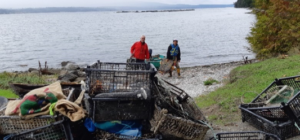
Noel Villard, Chris Page, Stewart Green, Tom Wyton, Howard & Mary Jane Stewart, Peter & Helen Mason, John Wigle, Alex Munro (Fanny Bay Oysters).
Sorting & Loading Team
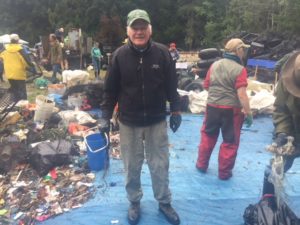
Nick & Philip Biebach, Wendy Boothroyd, Mike Berard, Kim Dunn, Tim Fuchs, Jim McConkey & Paule Deschenes, Skye Jasmine, Edi & Graeme Johnston, John & Liz Johnston, Cheryl Hurlburt, Peter Karsten, Claire Kennedy, Helen Mason, John & Barb Mills, Natalie Ban, Elizabeth & Allen Norris, Eileen O’Brien, Chris Page, Lisa Pierce, Angela Robinson, Jeanie Rodgers, Linda Sheehan, Andrew Slater, Steve Smith, MaryJane Stewart, Sussan Thomson, Noel Villard, Maryann Watson, Dorrie Woodward, Tom & Rita Zawilla.
Trucks, Trailers and Transport Team
Ongoing thanks to Shaun White for flat deck trailer; Steve Smith for assistance with loading & driving; Dave Lang for local trucking; Fanny Bay Oysters Company & Holly Wood Oysters Co. for picking up industry equipment; Ocean Legacy and Kingsley Trucking for plastic transport.
Denman Island Fleet of smaller trucks and trailers
Dan Stoneman, Edi & Graeme Johnston, John Johnston, Stirling Fraser, Noel Villard, John Mills, Tim Fuchs, Ron Shepard, Peter Mason, Chris Taylor, John Andrew, Russ Hicks.
Photography, Video, Creativity Team
Video & Photo Production: Sussan Thomson
Drone Master: Keith Clark
Photo Credits: Gerry Ambrose, Noel Villard, Linda Sheehan, Liz Johnston
Creative Installations: Wendy Pope.
Hot Chili Lunch
Many thanks to Judy and Bob Armstrong who prepared and delivered delicious hot chili, buns and apple cake to the 30 cold, wet, hungry volunteers at the Saturday sorting and loading.
Weird Washed-Up Items
This year we found something very special and touching – a beautifully crafted miniature BC Ferry, complete with unopened bottle of scotch, cigar, solar lights and a memorial plaque. It was found by Noel Millard and Chris Page at Boyle Point. They repaired it, and relaunched it for new adventures at sea
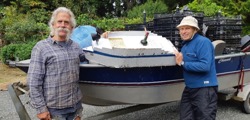
.
A sincere thanks to all, and
please let us know if we have forgotten anyone!
ADIMS Email: adimsinfo@gmail.com
A Small Island Awash in Plastic Debris
After 14 years of Community Beach Cleanups, Denman Island continues to be burdened with an unending flood of industrial plastic debris washing up on its beaches. Each year over 150 volunteers from Denman Island take part in the ADIMS event to tackle this ongoing pollution of their beautiful shoreline.
The beach cleanup has, sadly, become an annual tradition, one that everyone wishes would not have to take place next year. The volume of plastic debris landing on Denman’s shores continues to shock and overwhelm the island community.
This year, 2018, the beach cleanup on Denman alone yielded the largest amount of plastic debris to date, over 6 tons. This is despite this year’s Earth Day spring cleanup, organized in the hope that it would reduce the tonnage of debris collected in the annual fall cleanup.
For the second year, the beach cleanup was expanded to include all of Baynes Sound. ADIMS was joined by Fisheries and Oceans Canada (DFO) and the BC Shellfish Growers Association (BCSGA), who organized beach cleanups of Baynes Sound’s western shores.
Marine debris comes from many sources, including storm drains, fishing boats, and shellfish aquaculture facilities. However, ninety perc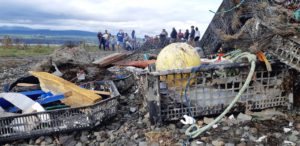 ent (90%) of the plastic debris comes from the shellfish aquaculture industry: oyster trays, anti-predator netting, plastic fencing, plastic net bags, plastic floats, styrofoam floats for rafts, and thousands of pieces of rope.
ent (90%) of the plastic debris comes from the shellfish aquaculture industry: oyster trays, anti-predator netting, plastic fencing, plastic net bags, plastic floats, styrofoam floats for rafts, and thousands of pieces of rope.
Baynes Sound is a shellfish aquaculture hotspot. It produces 50% of BC’s commercially grown oysters and clams. And winds and tides drive a huge amount of shellfish growers gear and equipment—it is a plastic-intensive industry—onto Denman Island’s shores.
One Denman volunteer explains, “There is just so much plastic debris continually washing up on our beaches. We just finished cleaning the whole island last September, and there was another smaller cleanup for Earth Day in the spring, and now we are still collecting truckload after truckload just a few months later.”
Denman volunteers worked all week collecting marine debris from the Denman Island shores, on foot and by boat. Over 40 stud ents from Denman Island Community School joined more than 100 community volunteers. Ninety-two year-old Jim McConkey, pictured here, was the eldest volunteer this year.
ents from Denman Island Community School joined more than 100 community volunteers. Ninety-two year-old Jim McConkey, pictured here, was the eldest volunteer this year.
At the same time, Comox Valley volunteers cleaned up the beaches of Baynes Sound west.
All plastic debris collected on Denman is sorted by volunteers on the Saturday of ‘beach cleanup week’. Ocean Legacy, a nonprofit plastics recycler, transports the many truckloads of plastic to Vancouver, so very little of what is collected goes to the landfill site. All reusable gear and equipment is returned to the shellfish growers whenever possible.
All three organizations (ADIMS, DFO, BCSGA) recognize that marine debris, particularly plastic debris, is a serious environmental concern. Regardless of the source, it is important that we remove debris from marine environments to prevent the degradation of important habitat.
In addition to being the centre of BC’s shellfish growing industry, Baynes Sound and Lambert Channel support a wide range of species. In particular, this is one of the most important spawning and rearing grounds on the BC coast for Pacific herring.
Beach Cleanup - September 15 to 22, 2018
14th Annual Denman Island Community Beach Cleanup
September 15 to 22, 2018
Denman Island Debris Drop Off Event:
Saturday, September 22, 2018, 9.30 am to 1 pm.
Debris Drop Off Location:Marcus Isbister Old School Centre - recycling area
We will be working again this year with our neighbouring communities in a joint ‘BIG BEACH CLEANUP’ to include shorelines of Baynes Sound & Lambert Channel.
This event is sponsored by the Association for Denman Island Marine Stewards (ADIMS), the federal Department of Fisheries and Oceans (DFO), and the BC Shellfish Growers Association (BCSGA).
Our beach cleanup is registered in the Vancouver Aquarium’s ‘Great Canadian Shoreline Cleanup’. [www.shorelinecleanup.ca]
Here is how you can get involved, register and participate!
- Sign up for a beach or a team
ADIMS will have a registration table Saturday Sept. 8 & 15 at the Farmers Market. You can register to clean a specific area assigned from the Denman Island map, or you can sign up with one of our teams. You can also register by email or phone.
ADIMS Beach Cleanup Coordinator Contact: Liz Johnston: lizjj@telus.net - Clean your designated shoreline area anytime during the week, to fit tides and your schedule, or work with a specific team on the beaches, or assist with sorting and loading.
- In the morning of Saturday Sept. 22, bring all your beach debris to the Old School recycling area for sorting and loading onto trucks.
- Or, drop off debris any time during the week at the Old School Recycling Centre if you can’t make it to the Saturday drop off event. Phone for pickup assistance or info.
After 11 am, participants are welcome to take any reusable items.
After 12 pm, volunteers will load trucks and complete sorting & recycling.
A wind-up beach party or event will be announced later (weather permitting).
We share a common interest in protecting our local waters from the negative impacts associated with marine plastic and debris. Please sign up and join this community event!
ADIMS Email: adimsinfo@gmail.com
Website: www.adims.ca
ADIMS Beach Cleanup Coordinator: Liz Johnston [lizjj@telus.net]
Applying pressure against geoduck aquaculture with our petitions
When DFO released its Integrated Geoduck Management Framework in March of 2017, we at ADIMS responded with a petition calling for a moratorium on geoduck aquaculture until it was proven safe within the marine environment.
Ninety percent (90%!) of Denman’s western shore is used by the shellfish growing industry. Geoduck aquaculture would further intensify industrial activity in the intertidal zone, and increase the threat to the marine ecosystem. The tenure applications for subtidal geoduck aquaculture are in the areas where herring spawn, on the north eastern side of the island. These installations could entangle spawning herring in netting, and degrade the spawning habitat. Added to those problems, the amount of plastic debris and microplastics that would be generated is dangerous and unacceptable.
We brought our paper petition to a couple of events in the following months, and several hundred Denman residents signed it. However, we realized we would need a more efficient means to gather emough names to influence decision makers in DFO, and politicians.
We had to up our game, so we put our petition online at Change.org. At the same time, we redesigned our website, adims.ca, to include a Take Action link to the petition. Since the website came online six weeks ago, we have gathered about 1100 signatures. With promotion, we could probably gather many more signatures, but now we’ve been given a chance to up our game once more.
Gord Johns, our Member of Parliament, has offered to sponsor our petition against geoduck aquaculture in Parliament. This will give us the opportunity to directly address Jonathan Wilkinson, Minister for Fisheries and Oceans, and challenge him to declare a moratorium on our coast.
Just 25 signatures give Gord Johns the chance to rise in the House and
speak about the issue of geoduck aquaculture.
This August, ADIMS directors will be at the Saturday Market gathering signatures, to prepare for the Fall session of Parliament.
- Those who have signed the previous petition may sign this new petition.
We want to give Gord Johns the opportunity to speak on behalf of protecting our marine ecosystem from a scheme that contaminates it with plastic, and degrades critical fish habitat.
